Humanities & Social Sciences
DGRT Benchmarks the CHUSS Cohort-based PhD Program
Published
3 years agoon
By
Jane Anyango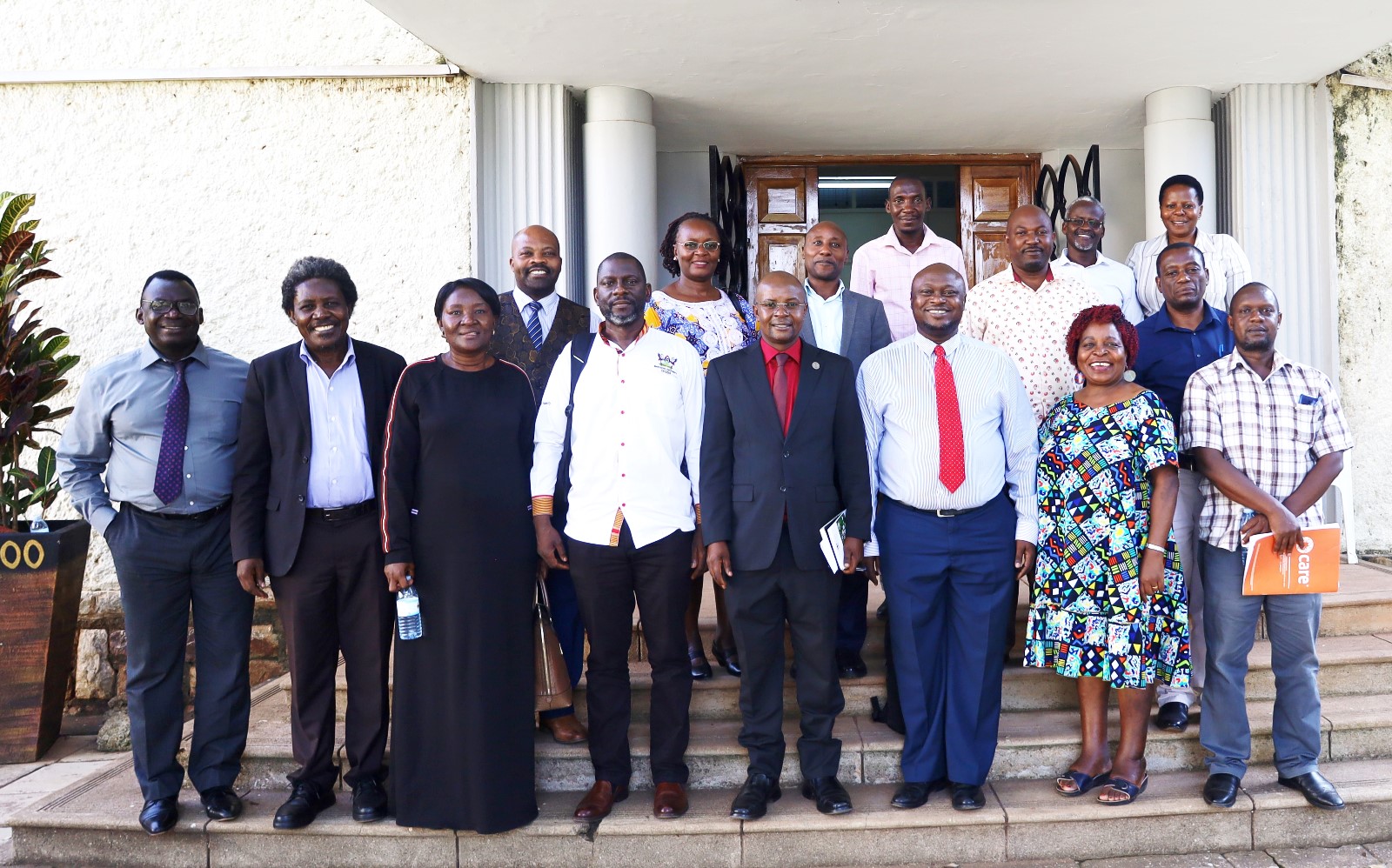
Officials from the Directorate of Graduate Research and Training (DGRT) on 7th March visited the College of Humanities and Social Sciences (CHUSS) to discuss strategies of enhancing the university’s capacity to increase the number and quality of PhD graduates.
CHUSS has been credited for presenting the highest number of PhD graduands in the last three consecutive graduation ceremonies with over 20 candidates representing 10% of the total university output.
The visit was a result of the issues that emerged during the recent Doctoral convention that was held at Hotel Africana where the Directorate was asked to come up with more concrete ways of engaging with colleges as the university strives to become research–led.
The team led by the new Director, Directorate of Research and Graduate Training Prof. Edward Bbaale wanted to understand CHUSS strategies for increasing graduate enrollment and how the college plans to uphold and sustain its upper hand in doctoral training.
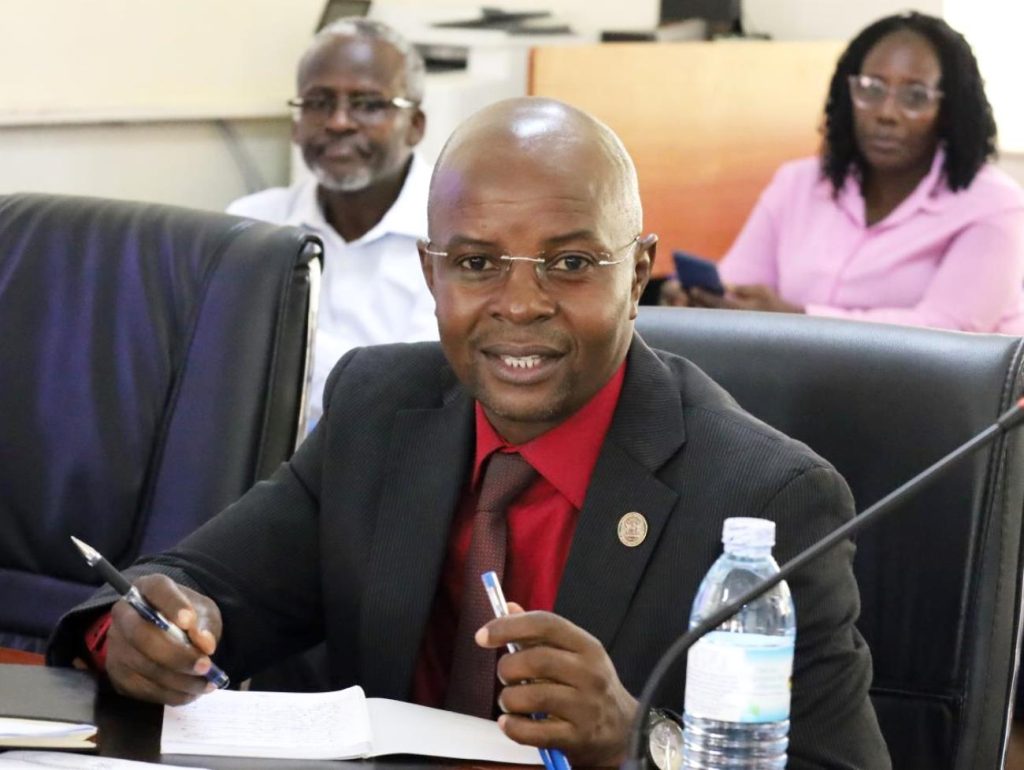
Statistics show that the CHUSS great PhD harvest comes from sponsored candidates which according to DGRT is a risk. The Directorate wants a sustainability plan and a strategy of locally funded students so that if donors withdraw, the college does not collapse.
The team also wanted to learn and pick a leaf from CHUSS that will be a spring board when visiting other colleges for emulation as best practices.
The other reason for the visit was to hear the bottlenecks to graduate training and research which are solvable through existing policy and policy proposals which have many stages with different gates at the Board of Senate and Quality Assurance among others.
The meeting was attended by the college leadership including Principals, Deans, Heads of Departments, program coordinators at school and departmental levels, administrative and other staff who discussed how they would lead a better and more efficient management and delivery of graduate research and training in the college.
The discussions focused on strategies to increasing on graduate enrollment, sustainability plan for managing graduate education and research at a predominantly Graduate school with experiences from the CHUSS Cohort –based PhD.
Presenting the accreditation, enrolment, graduation and admission status of CHUSS programmes ,the Deputy Director, Graduate Research and Training Dr. Julius Kikooma said the Directorate is focusing on tracking and engaging with colleges on graduate programs.
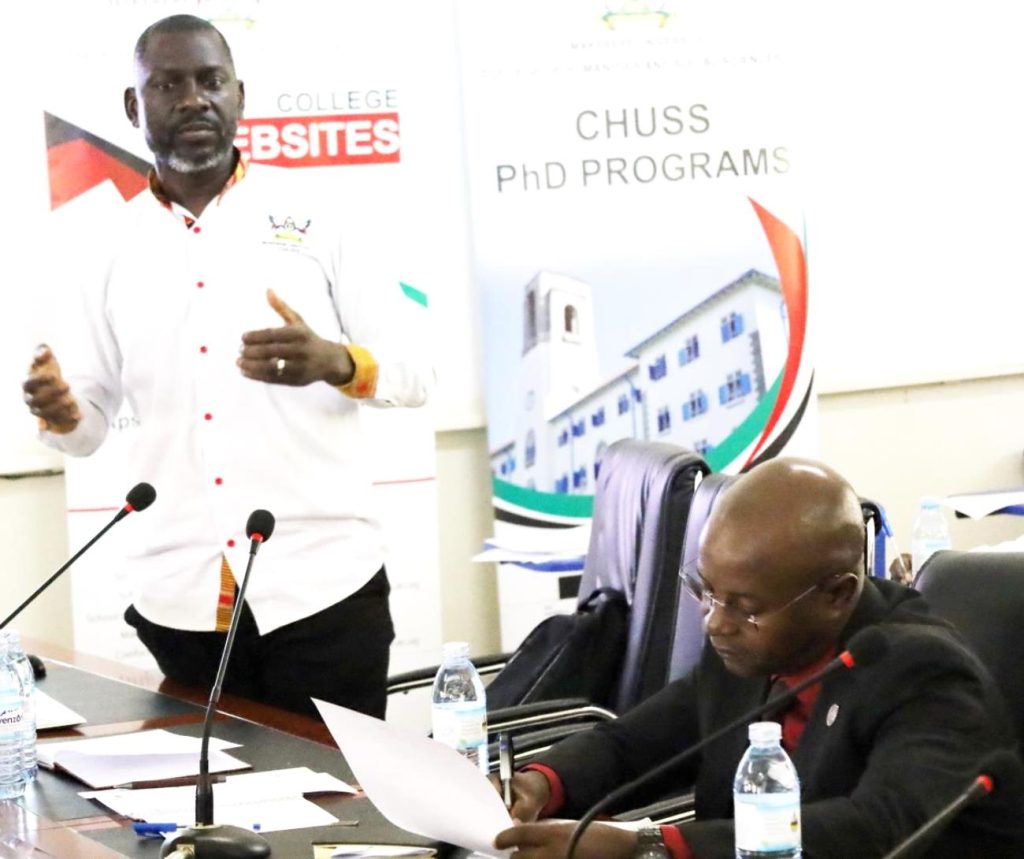
“In terms of graduate output, CHUSS has two outstanding strength in terms of PhD and Post Graduate Diplomas. We are not bad in terms of numbers but If you can deliver the highest number of PhDs, you can deliver the highest number of master because you are more diverse and have the potential” , Dr. Kikooma implored schools to come up with strategies to increase output from struggling programmes.
The Director, Directorate of Research and Graduate Training Prof. Edward Bbaale stressed that Makerere is committed to transforming into a research led university and as a Directorate they are committed to that agenda.
Prof. Bbaale reported that during the Doctoral convention at Hotel African, the Vice Chancellor Prof. Barnabas Nawangwe urged colleges to commit on centering graduate training and research in reshaping the graduate education landscape at Makerere University.
The research led agenda according to the Director, has put the DGRT on the steering wheel, exposed them, saying they are bare and, must deliver to shine.
“What management is interested in, is that you need to be more innovative as units and individual faculty. Makerere is great because many units have doctoral faculty with capacity to supervise PhDs who have moved through different levels and are bound to contribute to the strategic agenda”, Prof. Bbale stressed adding that staff can work with other units and jointly develop programmes.
Prof. Bbaale explained that besides administering matters to do with graduate training, the DGRT is charged with responsibility of ensuring a conducive policy environment for training and research and initiating policy reviews and recommendations through relevant organs for change.
“We are here to hear from you because CHUSS is one of the colleges to pick lessons as far as doctoral training is concerned. Congratulations for the largest PhD harvests over the last three years.. it brings on table how to sustainably remain there and increase.
We are also here to understand the roadblocks to a great graduate training and research and those that can be identified and solved through policy changes and also to hear best practices for recommendations”. Prof.Bbaale explained
He said the DGRT is guided by the Board of Research and Graduate Training which plays an oversight function, monitoring and evaluation to ensure compliance to standards with Senate as another gauge. As DGRT, Bbaale said, they provide a coordination role and are dependent on colleges that run day to day programmes.
DGRT planned activities for the year
Prof. Bbaale reported that the Directorate is already engaged in policy reforms and wants to invest time and engage colleges in policy orientations. He added that THE Directorate wants to have a post-doctoral policy as a good potential for graduate programs and a turning point for publications. The proposals is that the university earmarks funds to sponsor candidates outside so that research outputs are owned by Makerere.
In addition, the Director reported that the Directorate wants to be deliberate and intentional on streamlining graduate admission where it has no end, but to be structured and run on cohort – based PhD. The idea is to admit in cohort and follow students’ milestones.
The Director also said, the Directorate was rethinking of the taught PhD but moving hand in hand with PhD by research, to have a structure and curriculum of what the candidate must do at the end of PhD.
Further, Prof.Bbaale said they are working on upgrading the Graduate Handbook and other policies.
Strategies for increasing Graduate enrolment at CHUSS
Representing the Principal CHUSS, the Deputy Principal Assoc. Prof. Eric Awich Ochen said the college established the project coordinating office and a graduate coordinator, an initiative that can be replicated to support the deputy principal, and, a contact point for graduate training in organizing seminars, answering students concerns, mentorship and supporting supervisors.
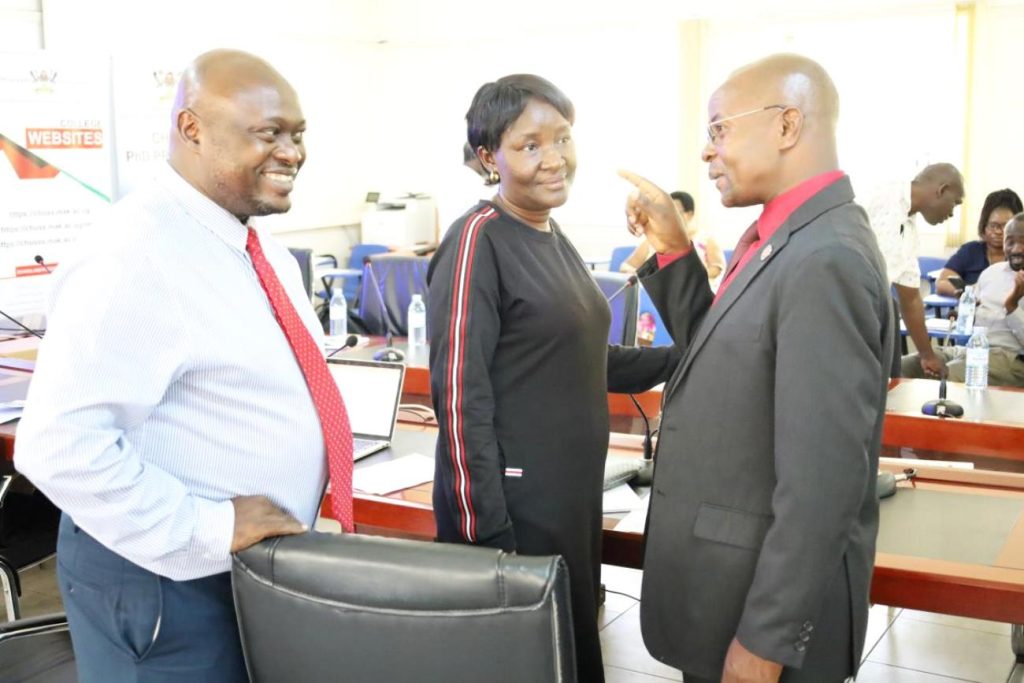
“This has helped control the drop outs and improve completion rates. Over the last six years, examinations of PhDs has improved and external examiners paid on time. 98% of examiners are happy, well-facilitated and the turn up of reports good at times within two weeks”. Dr. Awich said.
Dr. Awich said the CHUSS has strengthened and established a number of collaborations and attracted capacity building grants for research, graduate and Post Graduate training including Andrew Mellon and Gerda Henkel Foundations among others.
“We seek more opportunities for more cohort and PhD training as the best strategy to help students complete on time. As DGRT, there is need to help the university in identifying more partners”, Dr. Awich submitted.
At the national level, Dr. Awich said, the college works with the UPDF, Uganda Police and Prisons and has signed MoUs with the UPDF Senior Staff command plus over 25 other MoUs with local and international partners which presents an opportunity for Makerere to put its footprint.
To enhance the quality of scientific multi-disciplinary and multi-institutional research and scholarly writing and publications, Dr. Awich reported that the college established the Social Sciences Research Ethics Committee.
Dr. Awich added that the college graduate training and research has been strengthen by the nine centres and two research institutes that have been at the core of developing new and responsive PhD programmes and furthering partnerships and community outreach.
To increase the number of graduate fellows Dr. Awich proposed the need for the university to come up with a mechanism for fees waivers as a scholarship at departmental levels among others.
Experiences from the Cohort – based PhD Program
Speaking on behalf of the coordinators for the Andrew Mellon and Gerda Henkel funded PhD program, Dr. Pamela Khanakwa explained that since 2015 the college has been receiving 10 students every year from all over Africa with funding from Andrew Mellon and Gerda Henkel foundations.
Gerda Henkel Foundation, is a humanitarian foundation based in Germany which, on the African continent has funded research and graduate students through Lisa Maskell fund since 2009 -2010 when they partnered with the University of Stellenbosch under a premiership program which was called Partnership for Africa’s Next Generation of Academics (PANGeA).
PANGeA is a collaborative network of leading African universities developing research capacity and confidence in bringing African expertise to Africa’s challenges. The universities involved in the PANGeA network are the University of Botswana, the University of Dar es Salaam in Tanzania, the University of Ghana, Makerere University, the University of Malawi, the University of Nairobi in Kenya, Stellenbosch University, and the University of Yaoundé I in Cameroon.
In a bid to diversify, in 2015 PANGeA got into contact with Prof Edward Kirumira who was the then chairperson PANGeA and Makerere University was added in November 2016.
Dr. Khanakwa said the 1st cohort (2017) have all graduated with a PhD in humanities of Makerere University except one candidate who dropped out due to illness. In 2018, CHUSS admitted the 2nd cohort (10 students) and are in various stages of completion but was greatly affected by the pandemic. In 2019 the college had the 3rd cohort of 10 students, in 2020 another cohort of 8 students and the 2021 cohort that had 10 students.
Dr. Khanakwa explained that admissions are intense and done once under compulsory signed agreements and an almanac strictly followed.
“The college organizes cross cutting courses, writing workshops, progress reporting, mentorship and retooling workshops.
We also introduced pre-application workshops for competitive grants to help students know what funding agencies look for and the post doc grants.”
In addition, the college organizes dissemination workshops through different fora for students to reflect on what they are doing, invite scholars who comment on their work.
The college also supports students by providing them funds for space in Mawazo and other journals.
“The college also organizes supervisors retooling workshops on practices which have worked. This brings on heads of departments, deans and members from university units to remind members on their roles and graduate policies and practices”, Dr. Khanakwa stated.
Dr. Khanakwa also said the college endeavors to find avenues for supporting graduate students who are not on scholarship by putting slots to sponsor say 3PhDs and a masters on a different program with emphasis on creating a conducive environment for students.
The cohort system according to Dr. Khanakwa keeps the coordinators on love to look for partners and funding opportunities for students to sustain them and complete the program on time.
The Andrew Mellon and the Gerda Henkel support has made a community of scholars in the college and made CHUSS a vibrant intellectual community.By the end of this project, CHUSS would have educated about 60 PhD students.
The funding has also benefited the college in terms of infrastructure, contributed to the intellectual life and convened so far seven symposiums, the CHUSS Conversations and a number of seminars.
Discussions and proposals from the college
Members deliberated on the enablers and bottlenecks to research and graduate training, enhancing graduate supervision, selection of graduate students and challenges to graduate supervision
To increase the number and improve the quality of graduate training members proposed that the University makes a deliberate move to create space for graduate training, incentivize internal examination as extra load and allow CHUSS students from 2015 to be registered to complete.
It was proposed the university registers value in affiliations and treat them as opportunities, lobby government to support graduate training as this contributes to her vision and the National Development plans and address the staffing gaps.
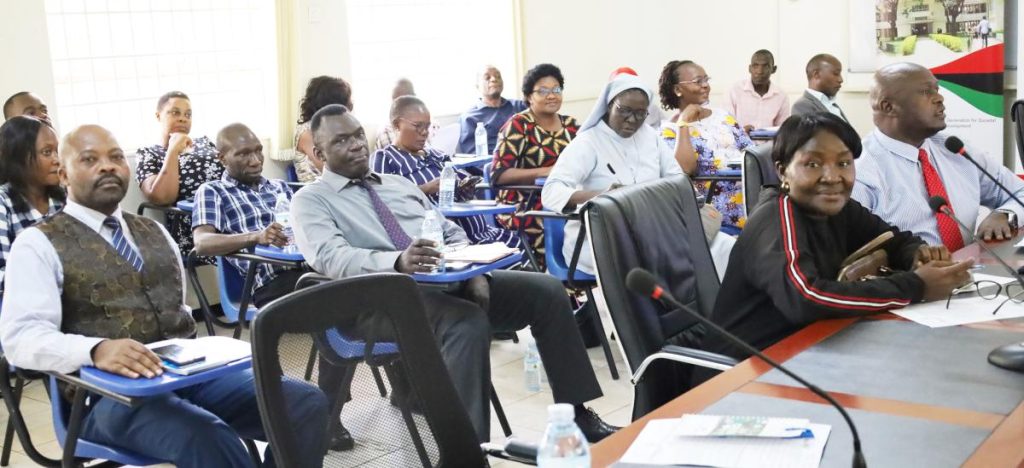
Management was implored to think about prorata, staff welfare and salary enhancement across the divide, expedite staff promotion process, review the Human Resource manual attaching attraction of funding to promotion and post-retirement contracts and put in place systems that bring in funds.
Members expressed the need for special training facilities for specific programs e.g. psychology clinic, musical theater , studios etc, having a deliberate policy to reduce the workload at the lower level of undergraduates, and, institute a budget for curriculum development and reviews to reduce reliance on donors.
In addition to revisiting PhD supervision equivalence to one supervision as a promotion requirement, members suggested that the two year contract should be revisited to allow more years to enable staff attract funding and to avoid losing faculty to other universities.
Members observed that there was need to initiate a policy for academic gain of being a head of department, dean etc, and the need to reduce the bureaucracy for curriculum development and reviews and that the DGRT should engage with Senate, NCHE and facilitate the process.
Conclusions and issues to be taken forward
The Deputy Director Assoc. Prof. Julius Kikooma appreciated members for raising pertinent issues and proposals adding that some of them are directed to management and the Chair Board of Research and Graduate Training while some were for the Directorate to pick.
Dr. Kikooma asserted that the Directorate considers the working conditions of staff and that is why they were on ground to pick the language and best practices for emulation.
He clarified that the Vice Chancellor is passionate about attracting funding for graduate training and has pledged to work with partners and engage government in a conversation.
“The Vice Chancellor was also committed to engage different partners to have a building for graduate school – a space that is characteristically for graduate students.
As a public institution governed by public service, increasing the staffing levels will depend on instructions from the relevant government organs”. Dr. Kikooma said
Kikooma added that the policy on PhD fellows is there and every department should have graduate fellows to redistribute the load, and its practicality and implementation can be dealt with
The Director DGRT Prof. Edward Bbaale said a lot had been noted for synthesis and the Directorate will come up with write-ups and engage where possible.
Prof. Bbaale explained that Government took over the wage bill of Makerere and all funds go to government and therefore not practical to have a percentage of PhD funds ploughed back to colleges.
“The college should budget for internal examination just like they did for external examination because motivation is critical and, incentive structures need to be correct.
The issue of undergraduates is no longer getting incentive to maintain. The idea is to gradually reduce undergraduate enrolment and increase graduate enrolment and therefore, there is no reason to hold the same number of undergraduates”, The Director explained.
You may like
-


CAES Presents Overall Best Performing Student in the Sciences & a Record 28 PhDs at the 76th Graduation Ceremony
-


Over 9,200 to graduate at Makerere University’s 76th Graduation
-


76th Graduation Highlights
-


Olivia Nakisita and the Quiet Urgency of Adolescent Refugee Health
-
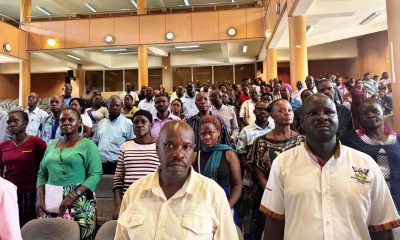

Support Staff Trained to Promote Safety of Students and Stakeholders
-
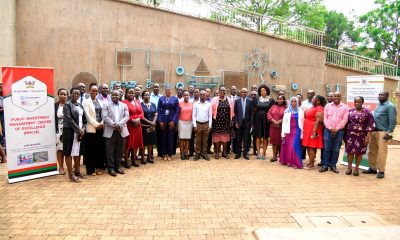

Makerere Hosts Second Cohort of MoKCC&MA Procurement Officers for E&S Safeguards Training
Humanities & Social Sciences
Meet Najjuka Whitney, The Girl Who Missed Law and Found Her Voice
Published
3 days agoon
February 23, 2026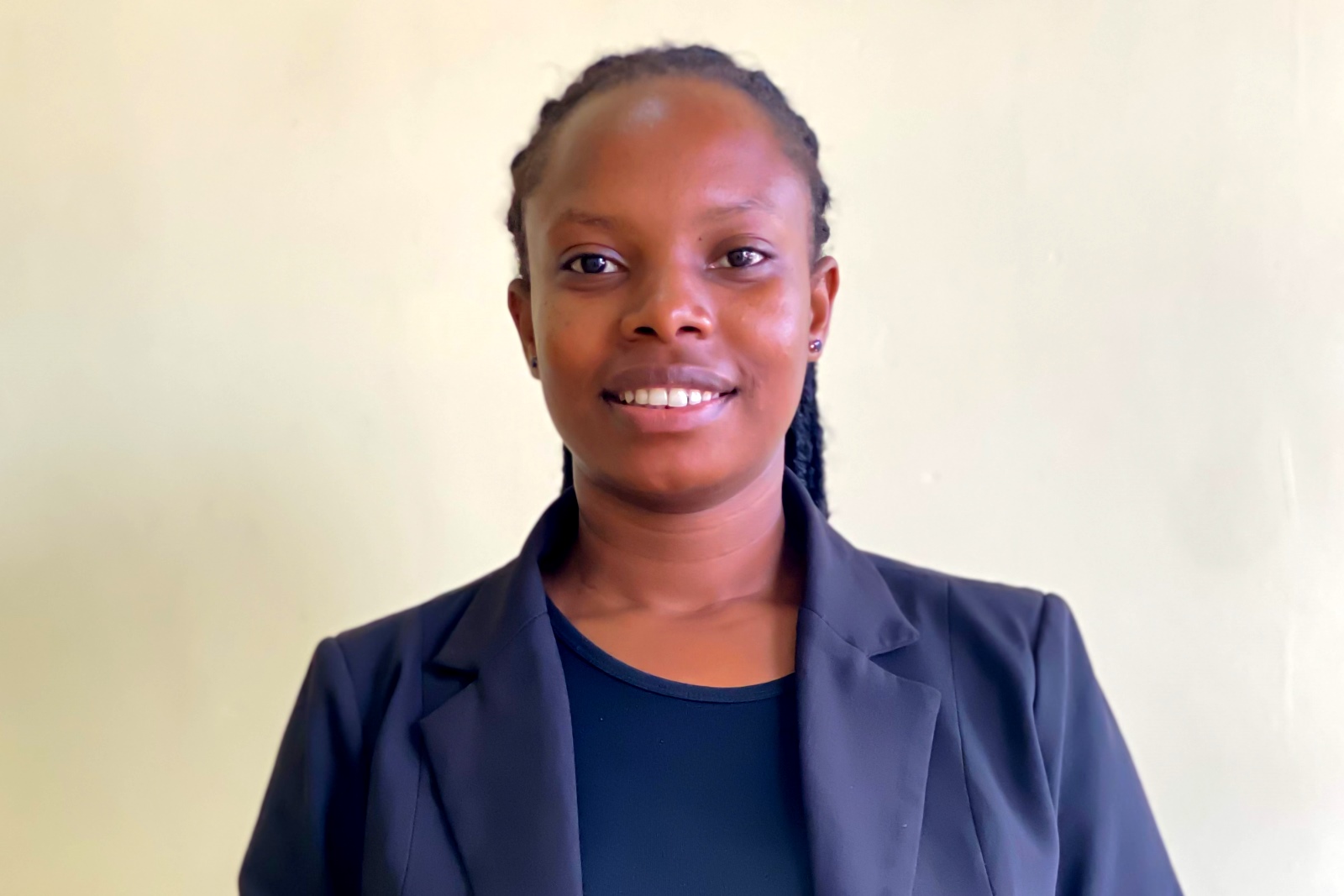
On the morning of Friday, February 27, when the academic procession winds its way across Makerere University’s Freedom Square for the last day of the 76th Graduation Ceremony, Whitney Najjuka will walk into history with a number beside her name: 4.46.
At Makerere, that number means First Class Honours. It means the Vice Chancellor’s List. It means she graduates as the only First-Class student in Journalism and Communication this year. But numbers, as Whitney has learned, rarely tell the full story.
Born on March 27, 2002, in Nabbingo, Kyengera Town Council, to Margaret Kusemererwa and Fred Kasirye, dreamt she would do Law, one of the disciplines, prestigious, almost inevitable next steps for a student who had excelled in secondary school. She had done everything correctly. Studied hard. Scored well. Followed the script.
But Makerere University had other plans. She missed the pre-entry mark, but found her name under Journalism and Communication, another prestigious course offered by the Journalism and Communication Department at Makerere University.
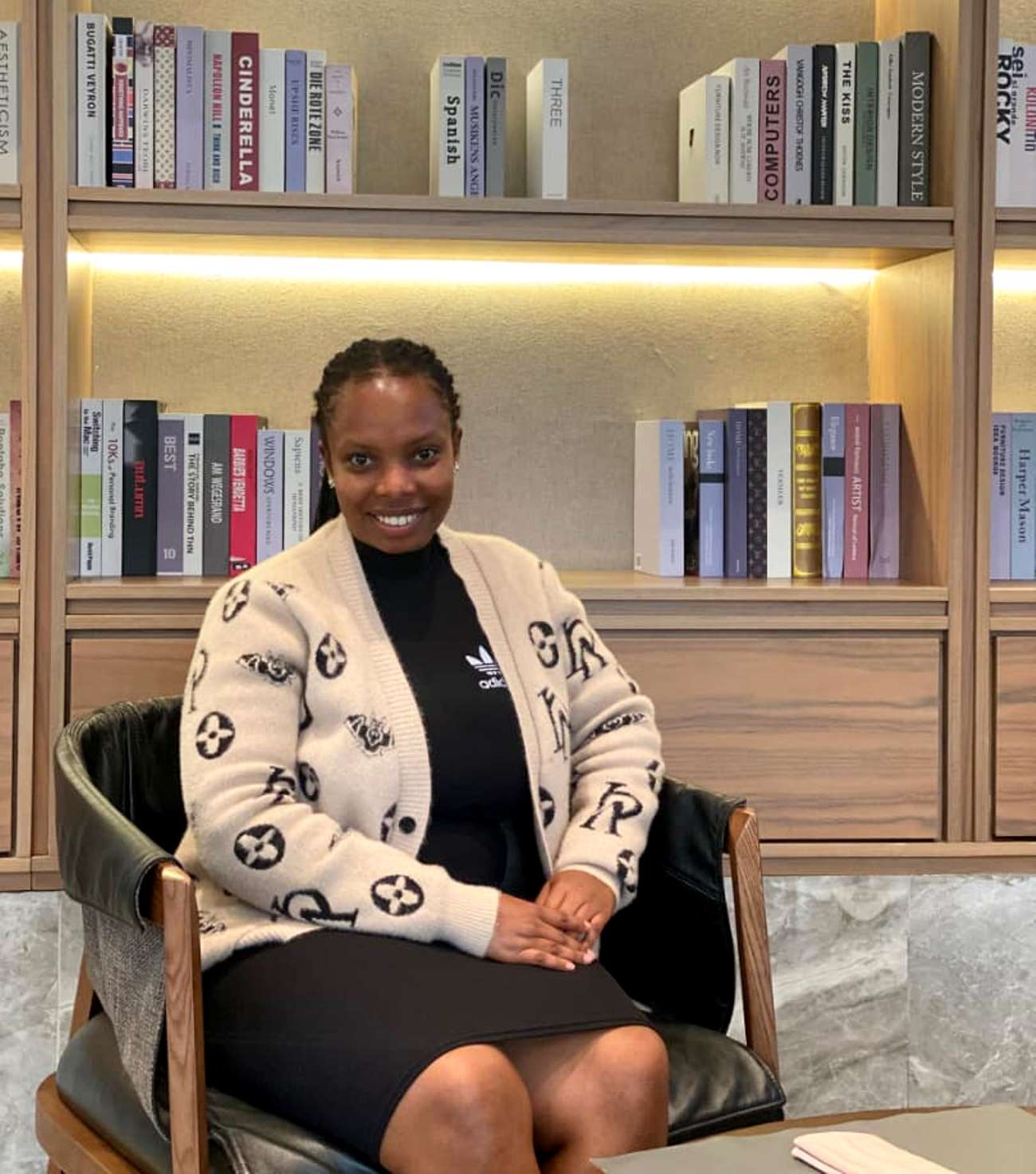
Najjuka began her academic journey at Muto Primary School in Buwama, earning 8 aggregates in the Primary Leaving Examination, a performance that positioned her strongly for secondary school.
She would later join St. Lucia Hill School, Namagoma, where she earned 20 aggregates at O-Level and 17 points in History, Luganda, and Divinity at A-Level.
Missing her dream course, Law, felt at first, like a detour. But Whitney was encouraged by Sanyu Christopher, her uncle, and she settled for a government-sponsored slot in the Bachelor of Journalism and Communication at Makerere, which she had applied for before.
She entered uncertain. But she graduates transformed.
The Pivot That Became a Purpose
Whitney speaks of her early university days with candor. She did not arrive at the Department of Journalism and Communication with a burning childhood ambition to be a journalist, but because another door had closed.
Then, Social and Behavior Change Communication happened. Applied Strategic Communication happened. She began to see media not as headlines and microphones, but as architecture, shaping how societies think, argue, and act.
The turning point came in her third year. The Female Journalist Foundation published her story on Sexual Gender-Based Violence (SGBV) and its emotional toll on survivors. What startled her was not its publication but the reaction. Comments flooded in. Debates ignited, especially about the role of men in combating GBV.
“I realized media doesn’t just report,” she says. “It frames how society views a crisis.”
Her voice, once tentative, had entered a national conversation.
The Discipline Behind 4.46
At Makerere University, a First Class CGPA is not built on brilliance alone but on ritual.
Whitney’s ritual began with showing up, on time, every time. She treated lectures as appointments with her future self. She refused to confine her learning to the syllabus. While attending workshops at the Aga Khan Graduate School of Media and Communication and obtaining external certifications, she sought and was open to mentorship through the Public Relations Association of Uganda (PRAU).
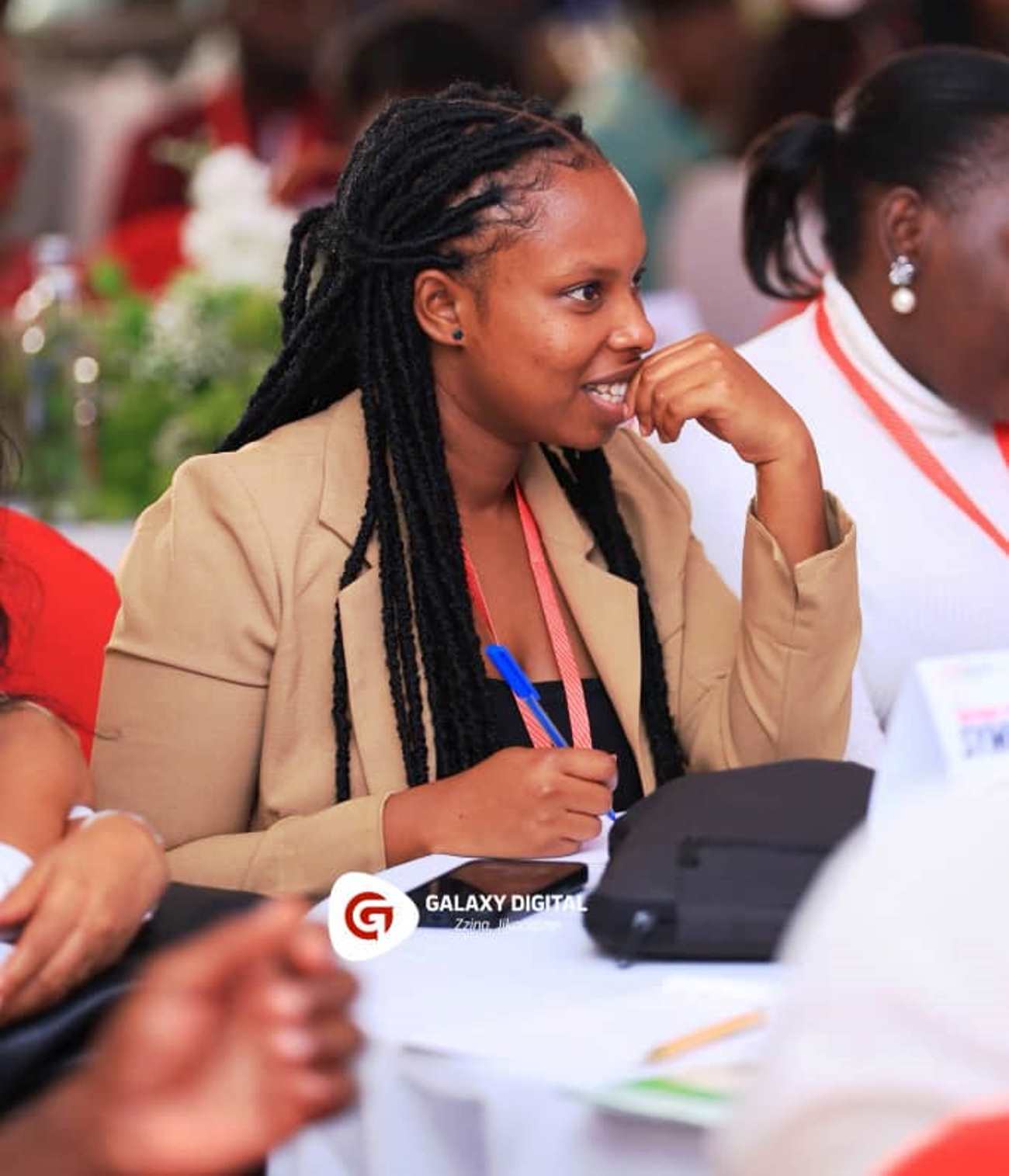
She wanted theory anchored in practice. And then there was the commute.
From Nabbingo, a hill in Wakiso District, some 18.6 km to Kampala, where the Makerere Main campus is situated, and back, nearly 20 hours a week dissolved into Kampala traffic. Two-hour journeys before 8:00 a.m. lectures. Dust. Noise. Headaches. She learned to manage energy the way others manage time. Fatigue became a tutor in resilience.
“I had to be intentional with every remaining hour,” she says. “Excuses were not an option.”
Learning to Practice Communication
If classrooms taught her analysis, presentations taught her courage. Pitching projects, defending research, and standing before peers quick to critique forced her to think on her feet. She was no longer simply studying communication; she was practicing it.
In 2024, the AGMES Fellowship at the Aga Khan Graduate School of Media and Communication pushed her further. She received funding to produce a capstone project on the mental impact of gender-based violence on survivors. She identified sources, conducted interviews, handled trauma with care, and worked with professional editors.
The Communication, she learned, is logistics and ethics as much as eloquence.
The Future She Sees
Whitney is optimistic about Uganda’s media landscape. The digital shift, she believes, has democratized influence. Young communicators are no longer confined to legacy newsrooms or offices.
Yet she sees a gap in the absence of structured research on sustainable, ethical, profitable independent media ventures in Uganda. Her ambition is not only to practice communication, but to study it. To produce data-backed frameworks that help young Ugandans transition from graduates to media entrepreneurs.
She wants to make the impact scalable.
What Remains
As the only First-Class graduate in her cohort, she is careful not to mythologize herself. “Success isn’t brilliance alone,” she says. “It’s a daily commitment when nobody is watching.”
Even before graduation, Whitney had stepped into the industry through a mentorship internship at Capital One Group (COG EA Ltd), a strategic marketing communications agency operating across East Africa.
At Capital One Group, we spoke to Paul Mwirigi Muriungi, the Managing Director and Head of Strategy, who spoke of Najjuka as a progressive and intentional young professional who approaches her work with curiosity, maturity, and responsibility.
“Her attitude is exemplary. She is teachable, receptive to feedback, and eager to grow. While technical skills can be taught, character, work ethic, and mindset determine long-term success, qualities that Whitney consistently demonstrates. Given her academic excellence and professional application, we believe she has a bright future both at Capital One Group and within the wider communications industry. She represents the kind of talent the profession needs: thoughtful, adaptable, and committed to excellence.
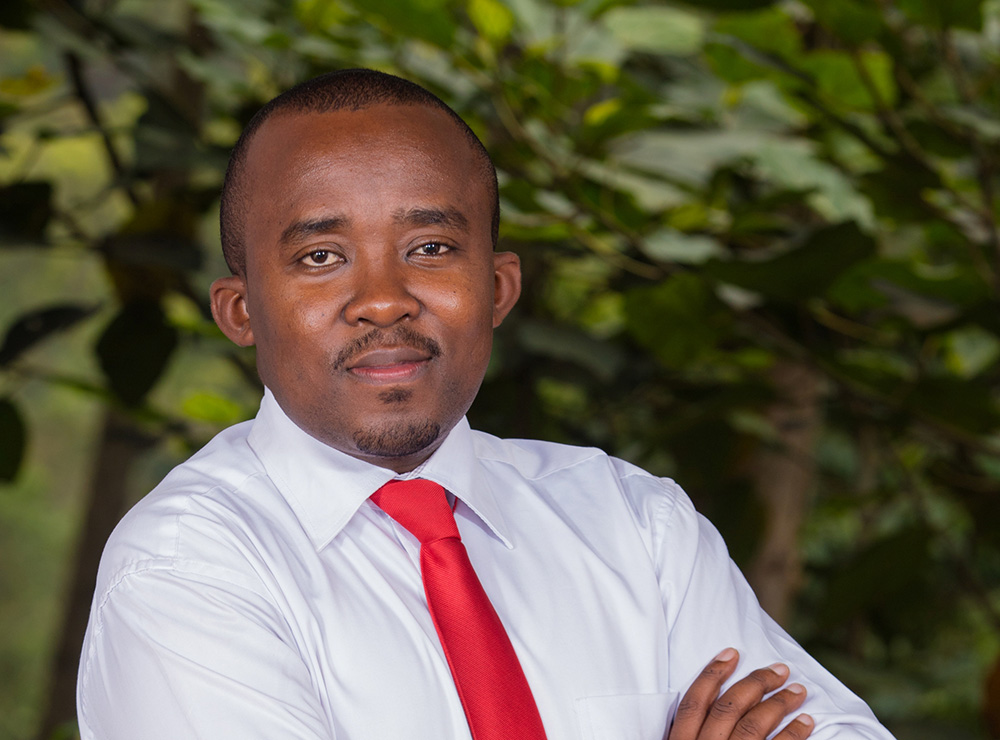
“We look forward to seeing her next chapter unfold,” says Mwirigi.
Najjuka’s gaze extends beyond her own trajectory. She speaks of what the Department could become. Furnished and equipped with industry-standard equipment, newsroom simulations, and deeper investment in data journalism as prayers. Her excellence is not self-congratulatory, but it is forward-looking.
“The University should support the Department to procure industry-standard equipment. Access to high-quality cameras, sound booths, and updated editing software like Adobe Creative Suite is critical to our learning environment,” she says.
Adding that, “We need a newsroom simulation, a physical or digital space where students work under real-time deadlines to produce content for the public. That would prepare us for industry and even strengthen the University’s own media platforms.”
In an era defined by metrics, algorithms, and digital traceability, data journalism is no longer a niche skill but a sine qua non of credible reporting. “There should also be more focus on data journalism and search engine optimization. These are no longer optional skills. Students would benefit immensely from stronger training in these areas.”
Dr. Aisha Nakiwala, the Head, Department of Journalism and Communication, says the faculty are very proud that she is graduating with a First Class—the only one in this year’s cohort.
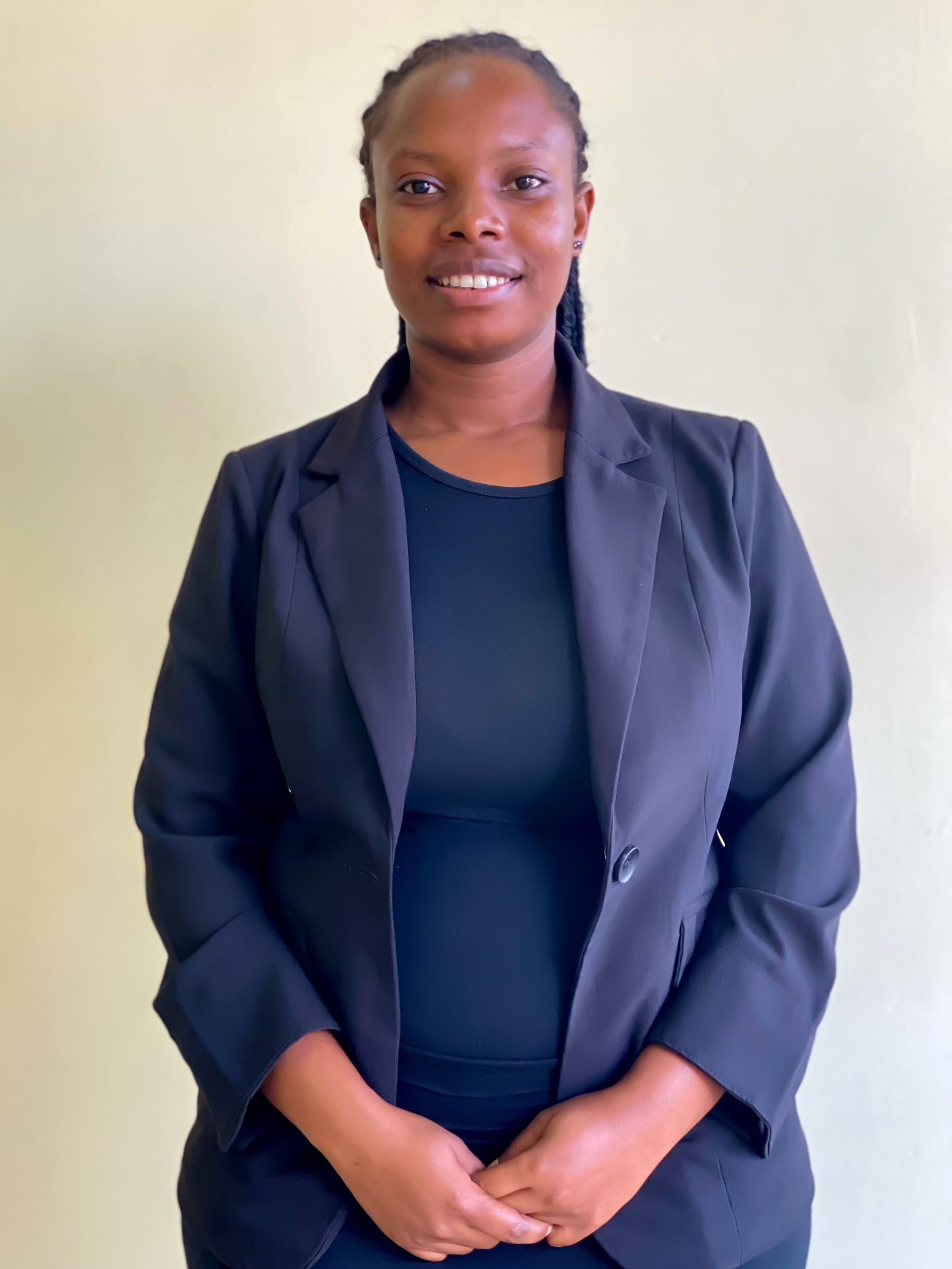
“This achievement reflects not only exceptional intellectual ability but also discipline, resilience, and sustained dedication to the highest standards over four years. Graduating with first-class honors is no small feat; it requires consistent outstanding performance.
“Her accomplishment sets a powerful example for continuing students and reaffirms our department’s commitment to nurturing excellence. We are confident she will make meaningful contributions to the communication profession and society at large,” says Dr. Nakiwala.
On graduation day, applause will crest and recede. The gowns will fold back into wardrobes. The transcripts will be filed away in cabinets. But something quieter will endure; a young woman from Nabbingo who once missed her Law mark, who spent 20 hours a week on the road, who discovered that storytelling is power, and who now walks into Freedom Square not by accident, but by intention.
Life, as she has come to understand it, lives on.
Humanities & Social Sciences
Dr. Pamela Khanakwa Honored for Steering Record 18 PhD Candidates for the Mak 2026 Graduation
Published
1 month agoon
January 23, 2026By
Jane Anyango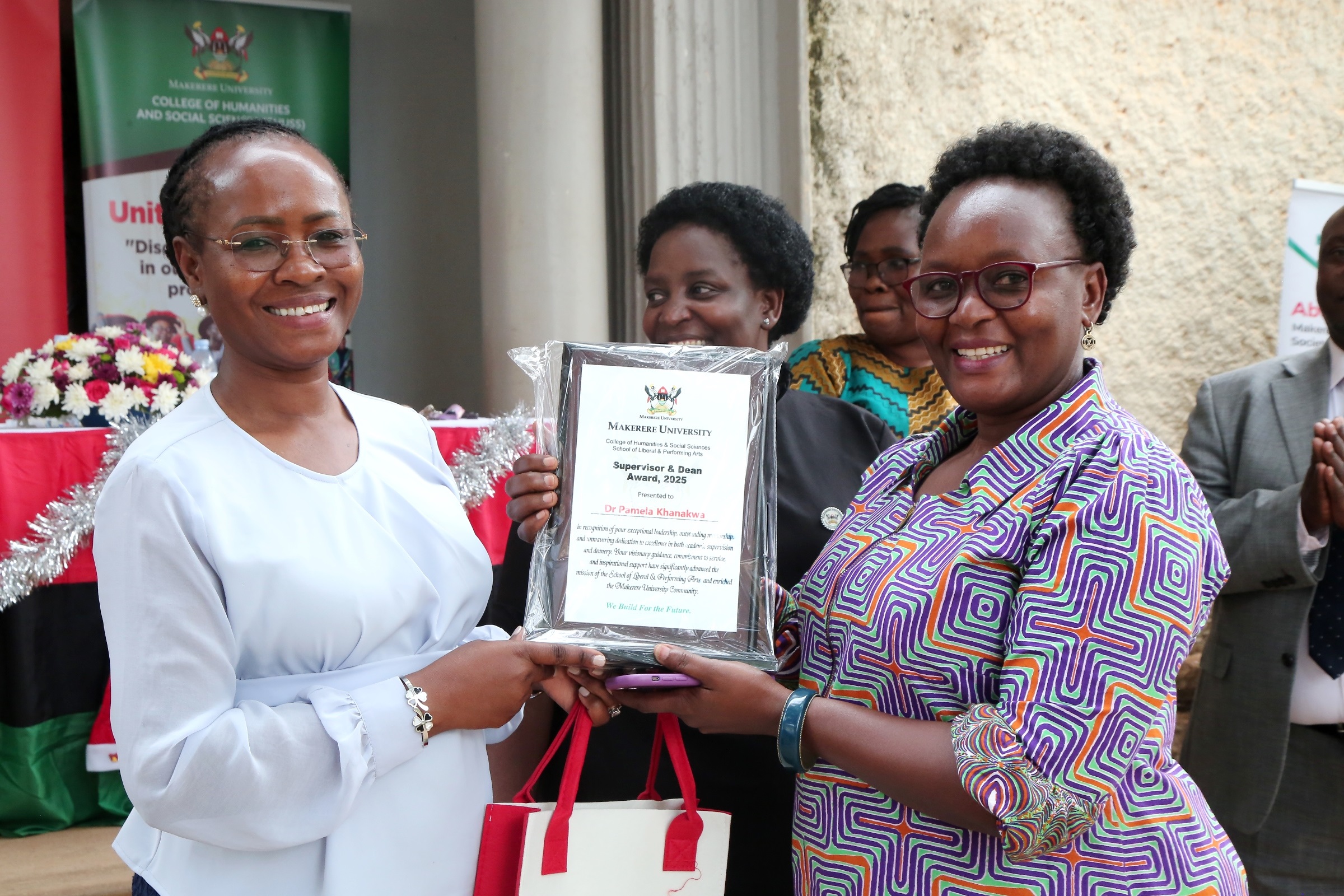
Six personally supervised, three completed in record time, as School of Liberal and Performing Arts sets a historic milestone. Dr. Pamela Khanakwa got the Award as Best PhD Supervisor and Dean
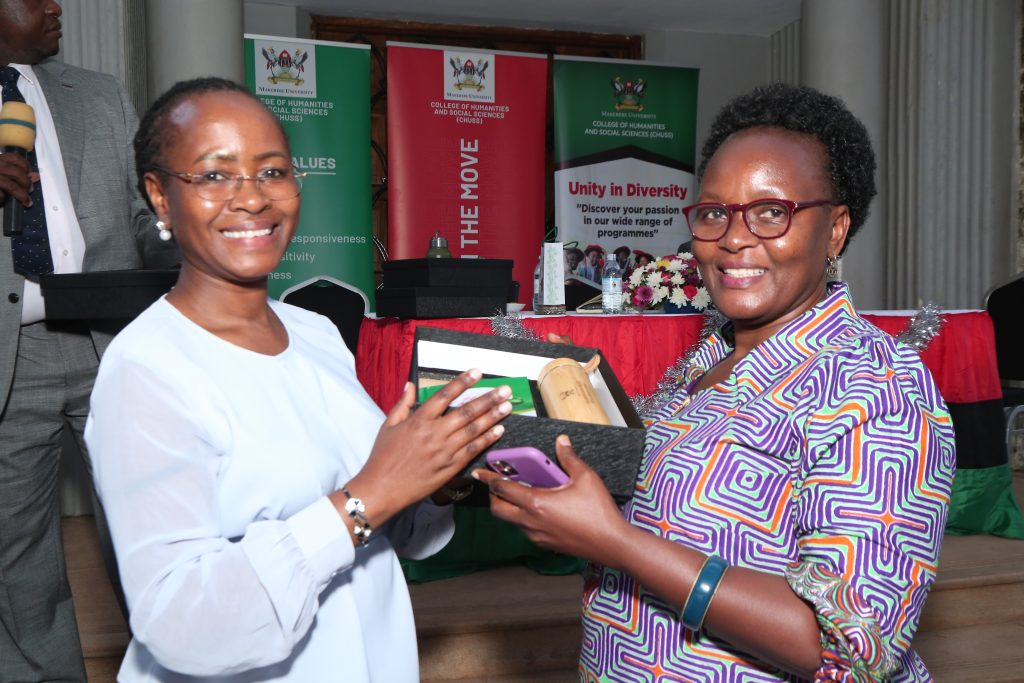
A Historic Academic Milestone for SLPA
The College of Humanities and Social Sciences (CHUSS) recognised the Dean of the School of Liberal and Performing Arts (SLPA), Dr. Pamela Khanakwa, for outstanding academic leadership that has seen the School field 18 PhD candidates for the next 2026 Makerere University Graduation Ceremony scheduled for 24th-27th February. Remarkably, six of these doctoral graduates were directly supervised by Dr. Khanakwa, with three completing within the official three-year timeframe, an exceptional achievement in graduate training. The recognition was announced during the CHUSS End-of-Year Get-Together, where staff applauded Dr. Khanakwa’s dedication, humility, and relentless commitment to postgraduate supervision and timely completion.
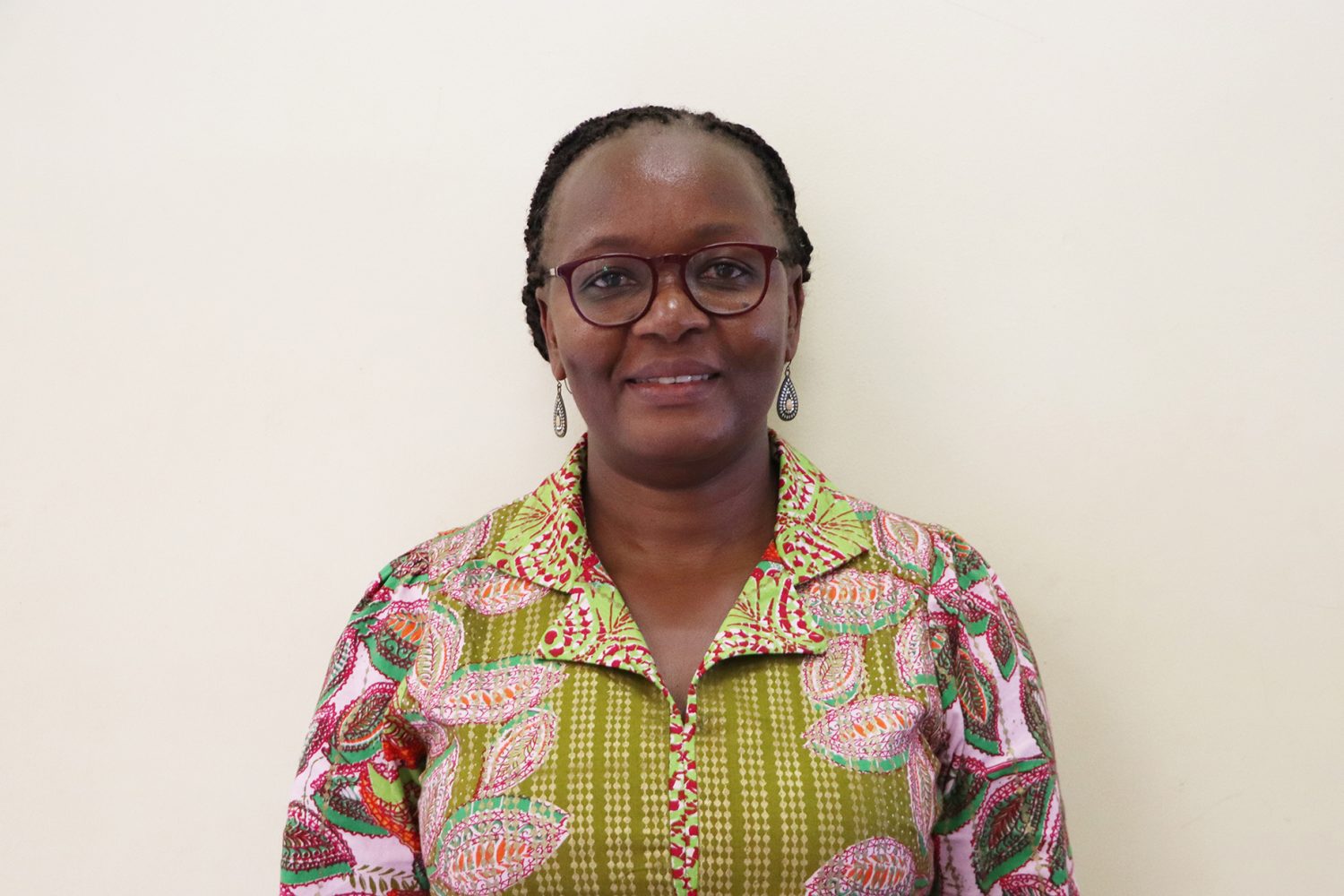
Message to Academic Staff
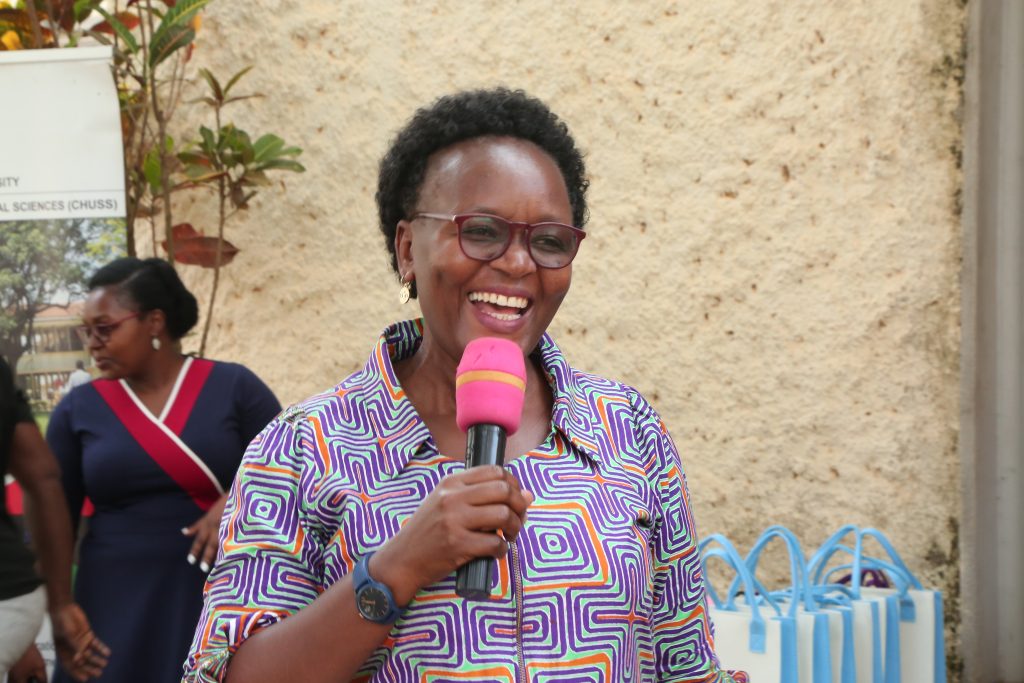
Q: What message do you have for your staff following this achievement?
Dr. Khanakwa:
First, I celebrate my staff and thank them for their dedication to supervision and student support. Academic work is demanding, and material rewards are often limited, but the true satisfaction comes from seeing students succeed.
I encourage my colleagues to remain committed. Yes, the workload is heavy, but many things are possible with dedication and teamwork. Let us continue working for the good of our students, our School, and Makerere University.
Leadership Rooted in Humility
Q: Many colleagues describe you as humble, down to earth, and hardworking. What shapes this character?
Dr. Khanakwa:
I think it is largely my upbringing. My mother was a primary school teacher from the 1950s until the mid-1980s. She worked extremely hard to raise us, combining teaching with farming to ensure we had school fees and basic needs. From her, I learned humility, discipline, and the value of hard work.
I also learned that leadership positions are temporary. You occupy them today, and tomorrow you move on. So humility is essential.
My graduate training also shaped me significantly. My PhD supervisor emphasized that graduate study is a full-time job and that results matter more than noise. Let people see your work through outcomes, not announcements.
Supervision as a Two-Way Commitment
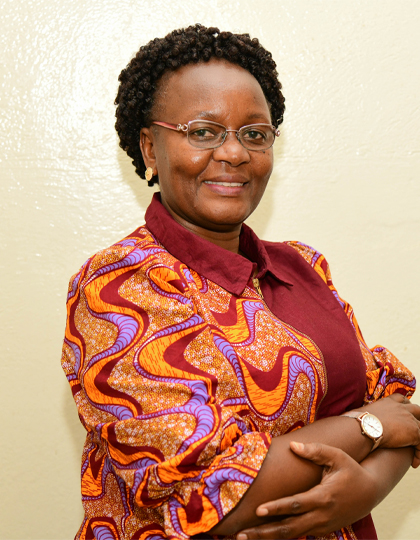
Q: How would you describe your supervision style?
Dr. Khanakwa:
I read my students’ work thoroughly, word by word. Sometimes my comments are tough, but they are honest. Supervision is a two-way commitment. I give feedback, but students must also respond and remain engaged. When that relationship works, progress happens.
Balancing Leadership, Scholarship, and Family
Q: How do you balance being a Dean, scholar, wife, mother, and daughter?
Dr. Khanakwa:
Honestly, I am not sure I balance perfectly. My mother lives far away in Bukwo, so visiting requires careful planning. My children grew up understanding the demands of academic life. I pursued my PhD in the United States and spent long periods away, but we adapted as a family.
Work has become part of my lifestyle. I use weekends to read dissertations, review manuscripts, and write. Sometimes my children ask if I ever sit without working, but this is the commitment I made. As we often say jokingly, “We humbly applied for the job, so let us do the job.”
Scholarship Beyond Supervision
Dr. Khanakwa is also an active scholar and editor. In the past year alone, she has:
- Edited scholarly volumes on archives, memory, method, and pedagogy
- Published a book with Routledge Companion
- Co-authored journal articles and book chapters with graduating students, including Priscah Asiimwe and Anatoli Lwasa Mpijja
“I feel an obligation to write with students,” she notes. “It takes time, energy, and commitment, but it is part of academic mentorship.”
Who Is Dr. Pamela Khanakwa?
Dr. Pamela Khanakwa is the Dean, School of Liberal and Performing Arts, College of Humanities and Social Sciences, Makerere University. She is a seasoned scholar, supervisor, administrator, and mentor whose leadership continues to redefine graduate training excellence. Details about Dr. Pamela Khanakwa can be accessed at: https://chuss.mak.ac.ug/en/personnel/pamela-khanakwa/
More details are available in her attached curriculum vitae.
The CHUSS End- Of-Year-Get-Together
On 12th December, 2025 the college leadership organised a get-together end of year gathering to take stock of the achievements, challenges and brainstorm together on how to move forward. The event was marked by entertainment, team building games, appreciation speeches, sharing a meal and a Christmas package for every staff
Retirees and staff recognised
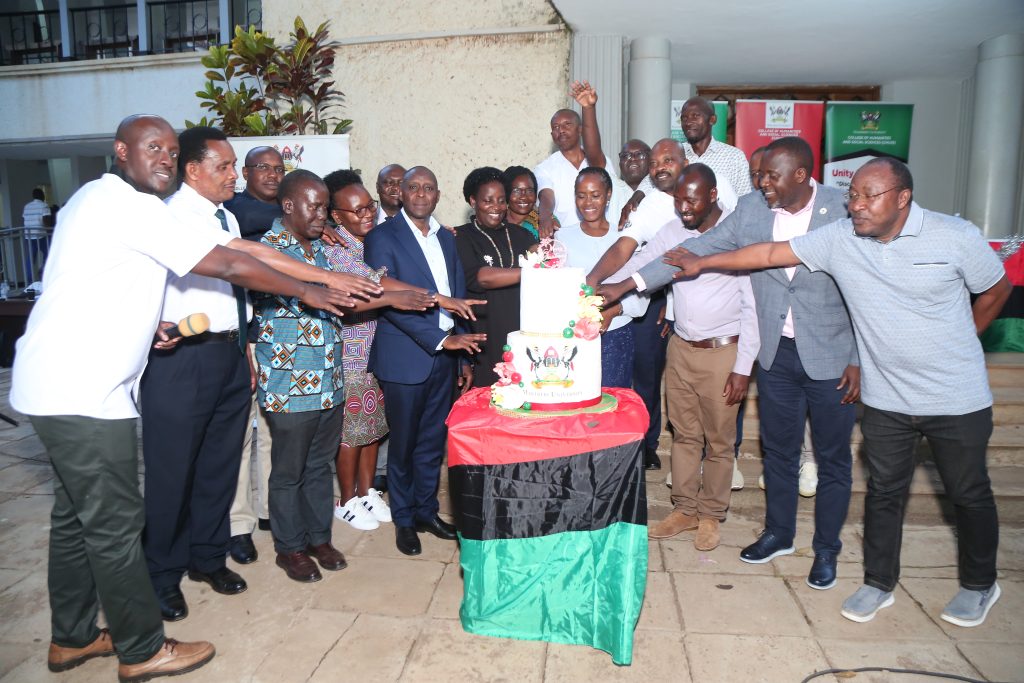
Five retired staff Dr. Micheal Wangotta Masakala, Dr. Anatole Kirigwajjo and Dr. Jackson Kizza Mukas (all from the School of Languages, Literature and Communication), Assoc. Prof. Florence Nansubuga (School of Psychology), Dr. Tusabe Gervase (School of Liberal and Perforing Arts) and Ms. Scovia Nganda Sekweyama (secretary from the School of Social Sciences) were recognised for their dedicated services to the university.
In addition to Dr. Pamela Khanakwa’s Award as Best PhD Supervisor and Dean, Ms. Birabwa Florence scooped the award of Best Registrar of the year. Birabwa is the registrar for the School of Liberal and Performing Arts.
Administrative and support staff including Ms. Mary Gyezaho and Annet Kashumbusha(both administrative secretaries in the Principals office), Farouq Lule (IT Officer), Godfrey Kakooza (cleaner), Charles Sebuguzi (driver) and Jane Anyango (Communications officer) were recognise with awards for outstanding service. Dr. Mohamed Mayanja Kajumba was from the School of Pyschology was recognised as the person with an outstanding talent in Handwriting.
The celebrations held in the Arts quadrangle were graced by the Vice Chancellor Academic Affairs Prof. Sarah Ssali and the Deputy Vice Chancellor in charge of Finance and Adminstration Prof. Ireeta Tumps.
Humanities & Social Sciences
Ugandan Journalists Trained on Peace and Gender-Sensitive Reporting Ahead of 2026 Elections
Published
2 months agoon
January 9, 2026By
Jane Anyango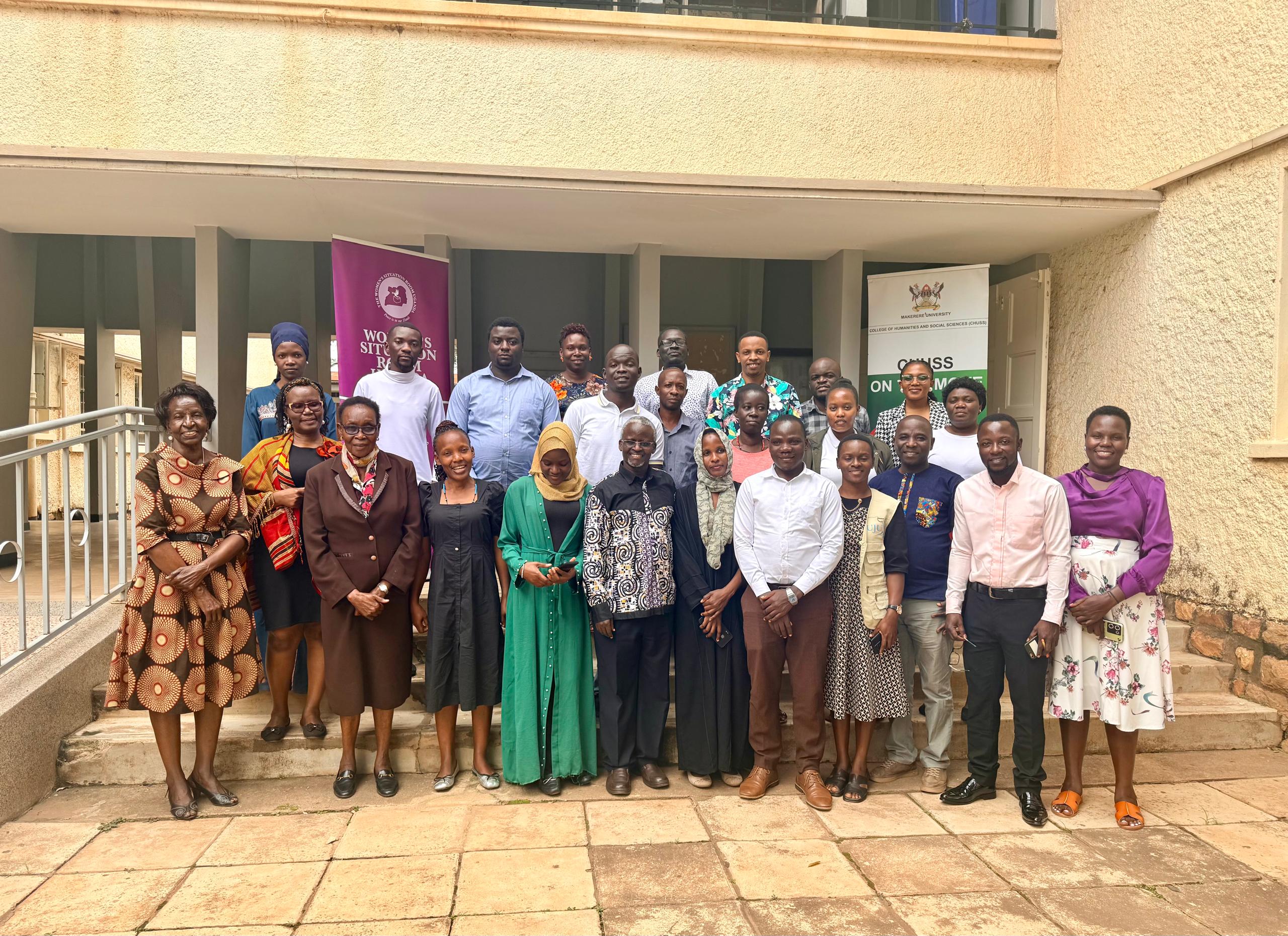
Kampala, Uganda – January 9, 2026
Ahead of the January 15 general elections, Ugandan journalists have undergone specialized training on peace and gender-sensitive reporting to ensure responsible media coverage during the election period. The two-day training, held from 8th to 9th January 2026 at Makerere University’s College of Humanities and Social Sciences Smart Room, was organized by the Women’s Situation Room (WSR) in partnership with various stakeholders and brought together journalists from across print, broadcast, and online platforms.
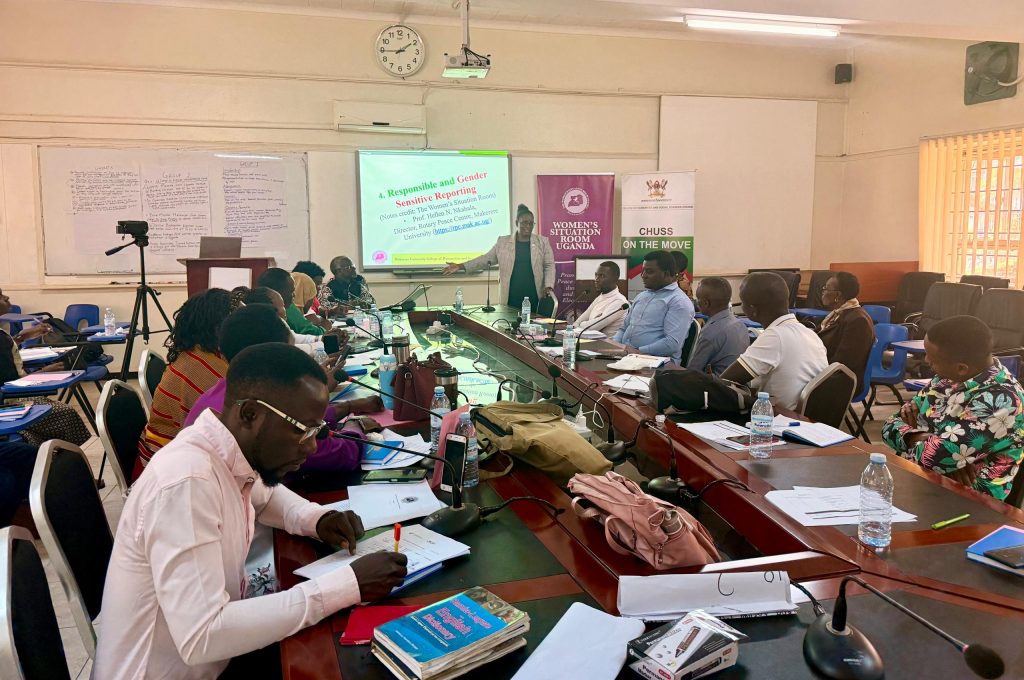
The main objective of the training was to strengthen the capacities of media in reporting and documenting electoral processes in a responsible and gender-sensitive manner. The specific objectives included: strengthening journalists’ skills to cover the 2026 elections in a fair, balanced, gender-sensitive, and non-violent partisan way; enhancing the role of media to enable citizens to be well-informed and actively participate in the election process; ensuring focused and balanced reporting on peace during and after elections; and strengthening partnerships between the WSR and media houses during the election period.
The training covered multiple critical modules. Day one focused on responsible conflict-sensitive reporting, emphasizing principles such as balance, impartiality, and accuracy. Participants explored the role of media as a relayer of the population’s voice, election monitor, catalyst for social cohesion and reconciliation, contributor to the accountability of political actors, and a platform for detecting and debunking digital media misinformation and hate speech.
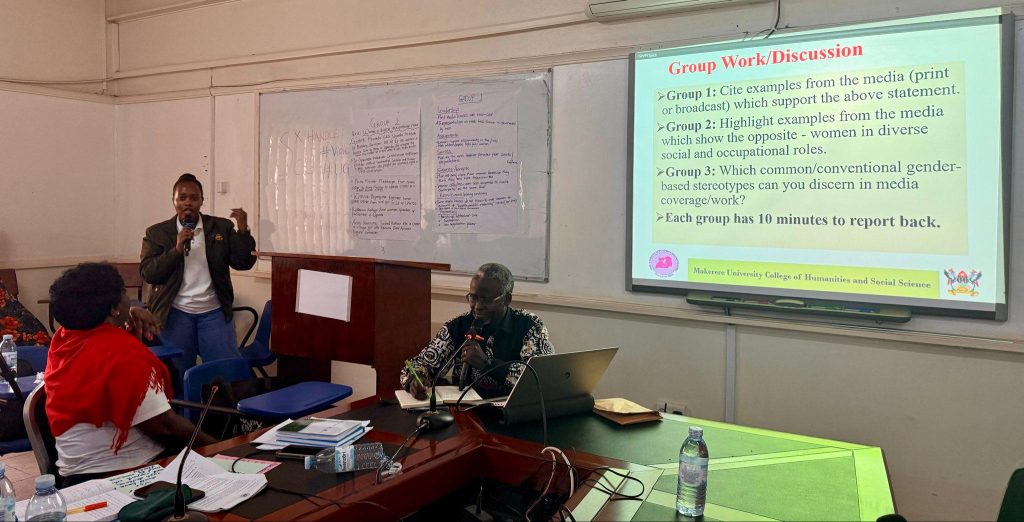
Day two addressed responsible and gender-sensitive reporting. Key aspects included the definition of gender-sensitive reporting, how to become a gender-sensitive reporter, critical elements in reporting with gender awareness, packaging gender-sensitive stories, and a checklist for detecting and avoiding gender-insensitive reporting.
Her Lordship, retired Judge Justice Mary Mayitum, emphasized the importance of peace as the foundation of development and democratic engagement. “Because we value peace more than anything. Without peace, really, you can do nothing. But where there is peace, you can have time to reflect, discuss with others, and join in meaningful dialogue,” she said. She warned that the country’s past conflicts, such as those in Gulu, underscored the necessity of maintaining national harmony.
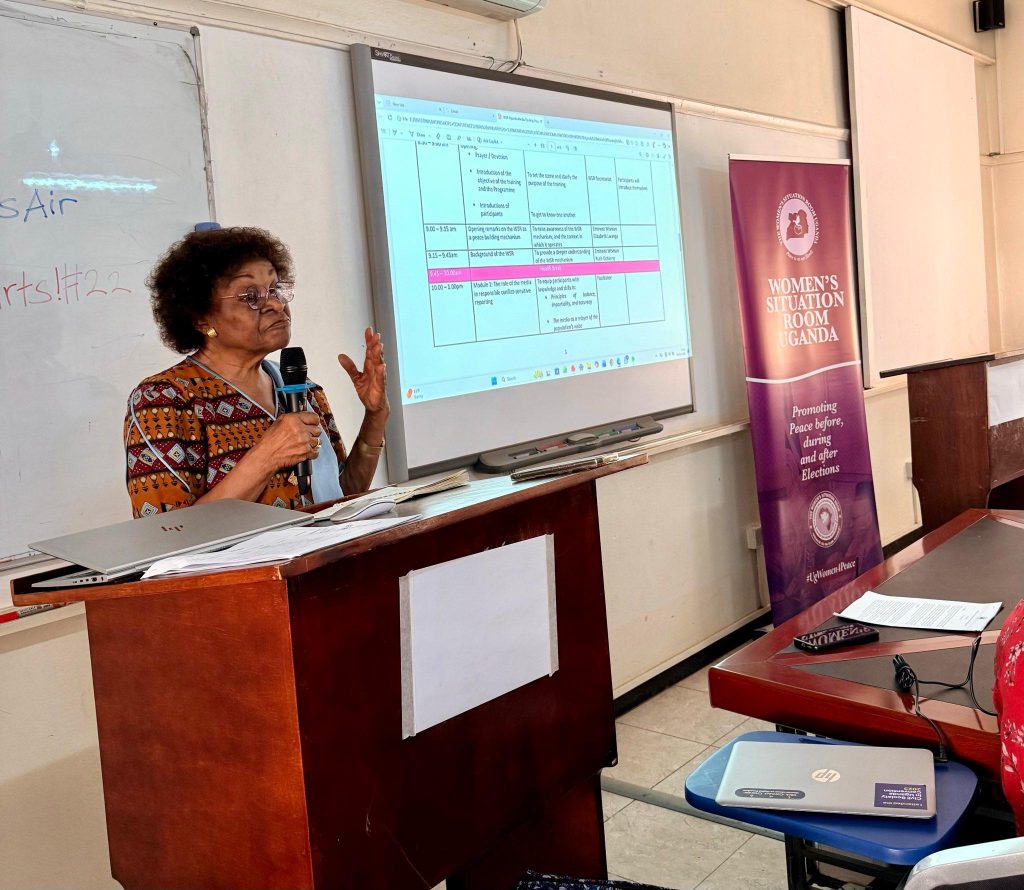
Justice Mayitum also urged other key election stakeholders to uphold peaceful conduct. “Being peaceful is the very heart of life. We have spoken to police, security personnel, political parties, and the Electoral Commission. We want politicians to have a code of conduct and to understand that it’s okay to think differently without fighting or hating one another,” she added.
Dr. William Tayebwa, lead facilitator and senior lecturer in the Department of Journalism and Communication at Makerere University, said, “This training is about conflict-sensitive reporting, peace journalism, and gender-sensitive reporting in the context of the elections. The emphasis was on giving female political candidates a voice while ensuring journalists report responsibly on election-related matters.”
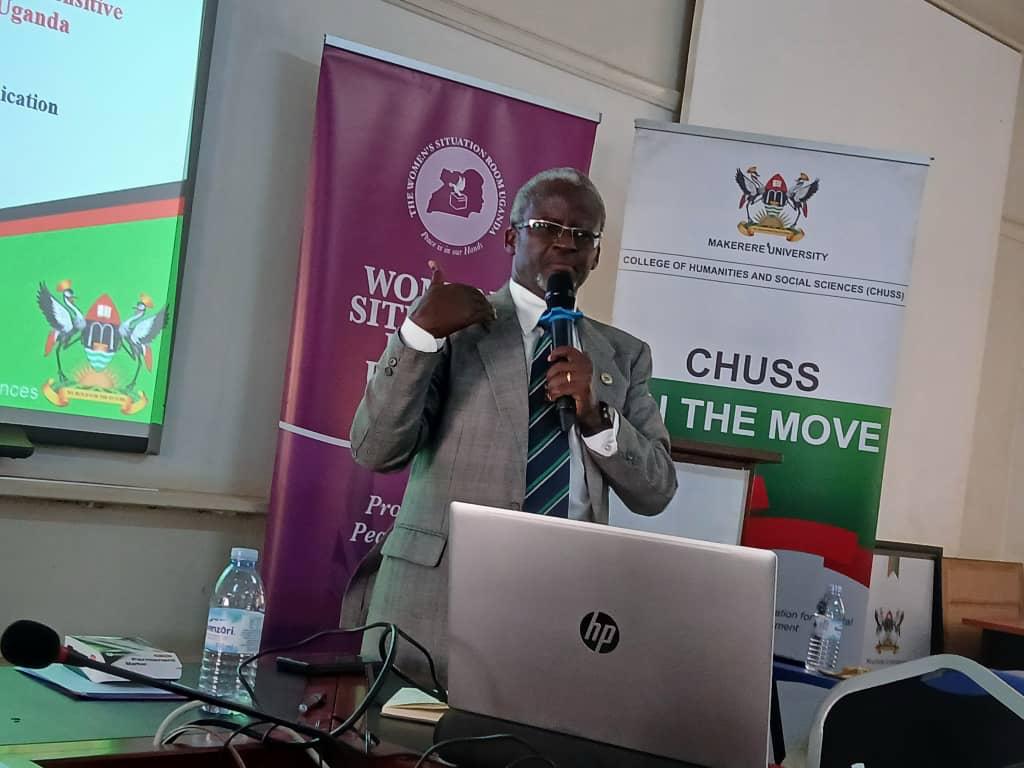
Participants described the training as timely and impactful. Tony Banizengabo of CBS Wakiso District said, “We’ve benefited a lot. We’ve been trained to write stories which bring peace, not conflict. Ahead of the elections, we are very ready to be part of peacemakers.”
Dorcas Kimono of UBC TV Kampala added, “It was so timely and rich. We learned how to report without promoting or fueling violence, giving voice to victims without angering them or encouraging violators. This is very vital, especially as we approach the 2026 elections.”
The training aims to equip media personnel with the knowledge and skills to uphold professional ethics while contributing to a peaceful, inclusive, and gender-sensitive electoral process.
Trending
-

 Humanities & Social Sciences3 days ago
Humanities & Social Sciences3 days agoMeet Najjuka Whitney, The Girl Who Missed Law and Found Her Voice
-

 Health1 week ago
Health1 week agoUganda has until 2030 to end Open Defecation as Ntaro’s PhD Examines Kabale’s Progress
-

 Agriculture & Environment6 days ago
Agriculture & Environment6 days agoUganda Martyrs Namugongo Students Turn Organic Waste into Soap in an Innovative School Project on Sustainable Waste Management
-

 General1 week ago
General1 week agoMastercard Foundation Scholars embrace and honour their rich cultural diversity
-

 Health2 weeks ago
Health2 weeks agoCall for Applications: Short Course in Molecular Diagnostics March 2026
